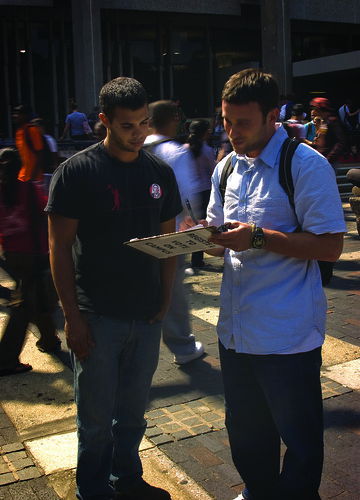Millions of Americans will go to the polls on Nov. 4 to cast their votes for the next president. For out-of-state students who are registered in other states, Election Day could be a difficult situation.
According to Temple’s 2007 student profile, approximately 32 percent of undergraduates are not Pennsylvania residents. Many students who are Pennsylvania residents do not reside in the Philadelphia metropolitan area. Temple students unable to vote in their respective states will have to turn to absentee ballots, or choose not to vote.

During this year’s Eighth Annual Conference on State Politics and Policy, professors from the University of Rochester and University of Maryland, College Park delivered a presentation titled, “Where Can and Should College Students Vote? A Legal, Empirical and Normative Perspective.” The professors discussed the usage of absentee ballots among students.
“Their main point was [that] some students across the country are facing undue obstacles to voting because the laws are not clear,” said Michael Hagen, a professor in the political science department.
“The laws regarding where students are allowed to vote, which are made at the state level, vary a good deal from state to state, and in many states the law is ambiguous,” he added.
Students who want to remain registered at their permanent home addresses can utilize the absentee ballot system. Voting by absentee ballot requires filling out a request form first. After receiving a ballot, it must be filled out and returned.
“Use of absentee ballots requires thinking ahead, and as I remember from my college days, thinking ahead was not my forte at 18,” said political science professor Joseph McLaughlin. “Some students probably don’t think of the absentee ballot option until it is too late.”
Timeliness is not the only factor that determines whether students decide to use absentee ballots.
“The absentee ballots are kind of too much of a hassle. Plus, I’m not politically savvy and I don’t care for either candidate,” said Ryan Healy, a senior business management major.
Healy, who is from Massachusetts, added he “might be more enticed to vote at home.”
While some students may not utilize absentee ballots for reasons similar to Healy’s, others do want to vote by any means necessary.
Junior music education major Rebecca Hollerbach said she is a firm believer in voting and has already sent her ballot request to her hometown in Maryland.
“I would vote no matter where I was,” Hollerbach said. “I think everyone should make an informed vote in the election regardless of their party affiliation.”
For those who want to go beyond voting and want to attempt to make their votes as influential as possible, McLaughlin said students should cast their votes where it can make a difference.
“Students who are really strategic thinkers might decide to vote in a battleground state rather than a safe state,” McLaughlin said. “If you live in New York, where Obama has a double-digit lead in the polls, you might decide to register here because Pennsylvania is a battleground state. This kind of thinking could apply regardless of whether you are an Obama supporter or a McCain supporter.”
Some students have already heeded the advice of McLaughlin.
John Vogtman, a senior civil engineering major from Maryland, decided to register to vote in Pennsylvania.
“I wanted to do this instead of the absentee ballot because Maryland is very Democratic, and I felt like my vote would matter more in a swing state like Pennsylvania,” he said.
Similarly, Robert Kay, a senior business major from Alabama, said he plans to vote in Pennsylvania.
“Alabama is very conservative,” Kay said. “I thought I would have more influence voting in Pennsylvania.”
Sarah Hutton can be reached at shutton@temple.edu.



Be the first to comment